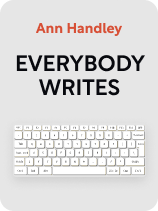

This article is an excerpt from the Shortform book guide to "Everybody Writes" by Ann Handley. Shortform has the world's best summaries and analyses of books you should be reading.
Like this article? Sign up for a free trial here.
What’s the best way to evoke emotions with your writing? How can you balance creativity with credibility when you write?
Whether you’re emailing your colleagues at work, posting on social media, writing papers for school, or writing content for marketing, creativity matters. In Everybody Writes, Ann Handley discusses why it’s important and how to achieve it.
Continue reading to learn about the importance of creative writing for all types of content.
Grounding in Creativity and Data
Handley discusses the importance of creative writing, explaining that writing that’s creative stands out more to the reader than writing that’s purely clinical. This is because creative writing evokes emotions, which connect to readers more than rationality does. To evoke emotions, write so that your reader can see themselves reflected in your content. You can do so by telling your reader a story or appealing to their senses like sight and smell.
As an example, you could include a success story in your marketing about a grandfather who was suffering from chronic muscle pain and found relief using your product. And, as a result, he was able to play with his grandchildren again.
(Shortform note: If your background is in creative writing, you may feel uniquely equipped to imbue your marketing writing with creativity, but you should be aware of some pitfalls. Creative writers often learn to tell their own stories in their writing, but, in marketing, your goal should be to tell the reader’s story or one they can easily relate to. You should also write with the intention of receiving some kind of response from your reader—whether it’s clicking on a link on your website, purchasing your product, or subscribing to your newsletter—so your writing should call the reader to action in some way.)
Handley particularly recommends using stories in your writing because these evoke emotions in your readers. Humans are better at remembering evocative stories than remembering data or concepts, so a good story will make your brand more memorable to your reader and thus make your marketing more effective. Stories also have the power to change the way we think and behave by appealing to us emotionally.
(Shortform note: Storytelling is one of the most useful and essential tools in marketing because stories are humans’ most natural way of learning and making sense of the world. Stories connect us to each other, stimulate our imaginations, and allow us to experience events and contemplate ideas within our own minds. You can use them to attract the audience you want, appeal to their specific needs and interests, and convey your message or the solution you’re offering in a way that feels real and personal.)
Handley cautions, though, that the persuasiveness of stories doesn’t mean you should neglect rationality in your writing: Your writing also needs to be based on facts and accurate data to reach your audience. Handley points out that a brand’s writing presents them with a great opportunity to build credibility and trust with customers. But, done poorly, writing can also destroy a brand’s credibility. Because of this, she suggests that brands should hold themselves to higher standards of credibility even than journalists, embodying a devotion to truth, consistency, duty, and a willingness to share knowledge with everyone.
Your product description for your muscle pain supplement will be more compelling if it includes a description of how the supplement works or statistics about how many people found relief from it. On the other hand, if it’s filled with obviously false science or fails to explain what the supplement actually does, your reader will write you off as not credible and not buy your product.
(Shortform note: Because the accuracy of your writing is essential to your credibility, and your credibility is essential in reaching your audience, make sure the sources you’re getting your information from are reliable. Reliable sources are up-to-date, written by people with expertise on the topic, and as unbiased as possible, among other things. You should also consider the source’s platform—a peer-reviewed online journal is more credible than a social media post.)

———End of Preview———
Like what you just read? Read the rest of the world's best book summary and analysis of Ann Handley's "Everybody Writes" at Shortform.
Here's what you'll find in our full Everybody Writes summary:
- Why there is no such thing as a bad writer
- A guide to improving your writing and reaching your audience
- How to adapt your writing to different formats while maintaining your voice






